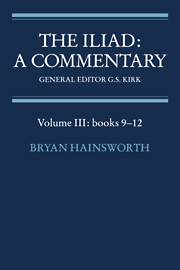Book contents
Book 10
Published online by Cambridge University Press: 03 February 2010
Summary
In the scholia to book 10 two other versions of the Rhesos story are reported. First, a version attributed to Pindar (Arn/A and bT at 435) in which Rhesos comes to Troy, performs heroic deeds that so alarm Here that she sends Athene to despatch Diomedes and Odysseus by night to kill Rhesos as he sleeps. Second (Arn/A at 435), some said that an oracle had declared that if Rhesos and his horses once drank the water of Skamandros they would be invincible; accordingly he was killed by the two heroes the night he arrived before Troy. This second version was also known to Virgil (Aen. 1.472–3) and to Servius.
Rhesos' entry into the battle, the absence of Dolon, and the role of Here and Athene, point to versions of the story radically different until the denouement from that told in this Book. The Pindaric version is clearly an allomorph of the stories of Penthesileia, Memnon, and Eurupulus: a late arrival at Troy, an aristeia, and death. Those stories became a canonical part of the tale of Troy, that of Rhesos did not. The oracle version is basically a story of a conditional fate: if Rhesos drinks from Skamandros he will be victorious, just as Odysseus will be safe once he reaches the Phaeacians (Od. 5.288–9).
- Type
- Chapter
- Information
- The Iliad: A Commentary , pp. 151 - 210Publisher: Cambridge University PressPrint publication year: 1993

